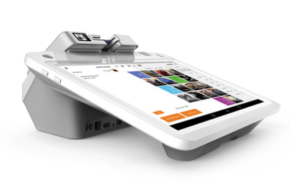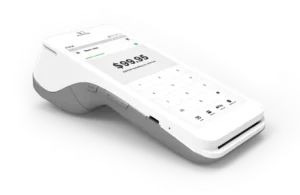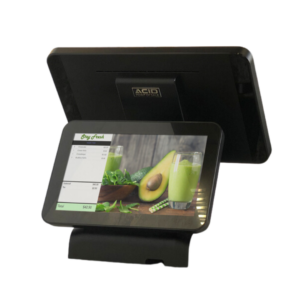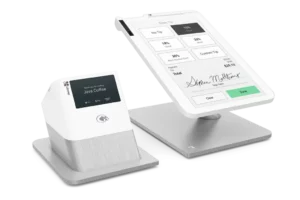
You are probably in the process of researching and comparing different point-of-sale system options. The speed, functionality, and capabilities are what differentiate top POS systems. Read on to learn what exactly a POS system can do and how to choose the correct system for your business.

A point-of-sale (POS) system is a set of hardware and software that allows your business to accept payments. Whether a customer is checking out online or in person, the point-of-sale system simplifies payment processing and accelerates the checkout process.
In the past, an in-store cash register was every company’s point-of-sale system. Nowadays, it can all be done online with the correct hardware and software. What does the hardware and software consist of?
A POS system is made up of multiple hardware features and a base or advanced POS software. When choosing the right system for your business, it is essential to evaluate all components of each POS competitor. Here is a breakdown of POS software capabilities and hardware features.
A POS terminal enables your business to collect and process payments. It can consist of an in-store cash register, countertop terminal, or a mobile card reader that is connected to a device via Bluetooth.

As the name implies, a barcode scanner allows you to quickly scan items during the checkout process. This is especially beneficial for businesses with a large catalog of products.

For customer convenience, it is common for businesses to display items and their prices as an employee is checking them out in-store. Typically, an employee and customer would be viewing two different screens.
After the checkout process has concluded, it is necessary to provide the customer with a receipt of sale. This hardware device prints the receipt. A receipt printer is beneficial for businesses that sell to customers in-store.
If customers pay with cash, your business will need a physical cash drawer. This where your business’s cash is stored and is connected to the rest of your POS hardware.
When choosing a POS software, it is important to review its base capabilities. Most POS software offers transaction calculation functionalities, sales tracking, and inventory management. Some software offer more advanced features that typically apply to larger businesses.
Some businesses require more advanced POS software capabilities. For example, select POS software will offer loyalty features, comprehensive reporting, or e-commerce capabilities. Pricing for these functionalities will be on the higher end.
Now that we know what POS systems are comprised of, we need to understand how the POS system actually works. Next, let’s review the steps that a POS system takes as part of the point-of-sale process.
The customer has decided which product or service they would like to purchase. The first step of the point-of-sale process is for your POS system to record the items or services being purchased. If products are being purchased in-store, then this is when each barcode would be scanned. This is also the stage where the POS system will calculate the transaction total and check inventory.
The POS system has now registered and recorded which product or service is being purchased. Now, the system will collect the customer’s payment. This could be through a virtual terminal online, a mobile card reader, or some type of retail terminal. At Coast 2 Coast, we offer a wide variety of different terminal options from PAX, Ingenico, Verifone, Clover, Poynt, and many more.
The purchase was successful. It is now time for your POS system to generate a receipt for the sale. This is typically done with a physical receipt printer if the sale is in-person or online if the product or service was purchased online.
If your business offers loyalty rewards, the points can be processed directly through your POS system. This is the final stage of the point-of-sale process with a POS system!

If you need assistance in choosing the right POS system for your business, get in touch!
© 2022 Coast 2 Coast Payments All Rights Reserved
Coast 2 Coast Merchant Services LLC is a registered partner/ISO of Elavon, Inc. Georgia
Registered ISO of EPX, TSYS